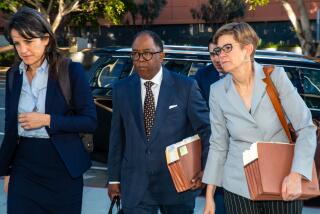Mistrial Bid Refused in Hedgecock’s Case : Defense Attorney Is No Longer Upset by Surprise Witness for Prosecution
- Share via
Superior Court Judge William L. Todd Jr. on Wednesday denied a request by Mayor Roger Hedgecock’s attorney to declare a mistrial in the perjury and conspiracy case against the mayor, rejecting a defense claim that a surprise witness would violate Hedgecock’s right to a fair trial.
Without explaining his action, Todd denied a motion by Hedgecock’s attorney, Michael Pancer, who sought a mistrial on the grounds that the late introduction of a prosecution witness whom Pancer said last week could “completely undermine” the mayor’s defense would not give the defense adequate time to investigate evidence before it was presented.
However, Todd did approve Pancer’s request to delay the testimony of Harvey Schuster, president of a Sorrento Valley investment firm, until next Monday in order to give the attorney additional time to prepare for cross-examination. Assistant Dist. Atty. Richard Huffman did not object to the delay.
Schuster, who Pancer said last week might testify about Hedgecock’s knowledge of the alleged role of former financier J. David (Jerry) Dominelli in bankrolling the political consulting firm that ran Hedgecock’s 1983 campaign, had been scheduled to testify Wednesday, when the mayor’s trial resumed after a 3 1/2-week recess. Although the mayor has said he was unaware that Dominelli helped finance the political consulting firm owned by Hedgecock friend Tom Shepard, the prosecution charges that Hedgecock had knowledge of the financial ties between Shepard and Dominelli.
‘Excellent Witness’
Following Todd’s action, Pancer said he was not disappointed, adding that tentative investigation into Schuster’s likely testimony has convinced him that the investment executive “will turn out to be an excellent witness for the defense.”
“At the time I filed the (mistrial) motion, if I had known what I know now about Mr. Schuster, I wouldn’t have filed the motion,” Pancer said. The attorney did not elaborate, however, on what had changed his mind about Schuster’s prospective testimony, which Pancer said last week could cause “irreparable harm” to Hedgecock’s defense.
Six witnesses testified Wednesday, including several top officials of Hedgecock’s 1983 campaign committee. During his examination of the Hedgecock volunteers, Huffman repeatedly sought to elicit testimony that would substantiate the prosecution’s contention that the mayor received much more in goods and services from Tom Shepard & Associates than he paid for during the special May, 1983, race to replace Pete Wilson after he was elected to the U.S. Senate.
Huffman asked banker Peter Q. Davis, treasurer of Hedgecock’s 1983 campaign, whether Shepard had ever been asked “to cut his profit” to help the campaign committee conserve money. Davis said he did not recall such a request being made, but added that he and other campaign officials believed that Shepard’s fee--15% of all advertising he bought on Hedgecock’s behalf--”was too much as a straight commission on advertising.”
Because of Shepard’s sloppy business methods and record-keeping, Davis said, he also occasionally asked the consultant to “substantiate” some of the bills he submitted to the campaign committee.
Sharp Exchanges
The testimony of Nancy MacHutchin, a close friend of the mayor and his major 1983 fund-raiser, featured several sharp exchanges between Huffman and MacHutchin, who displayed her apparent scorn for both the prosecutor and the proceedings. MacHutchin occasionally shook her head or rolled her eyes during Huffman’s questions, and gave curt responses to other queries, prompting Huffman to later tell Todd that she “is certainly not a friendly witness to the prosecution.”
MacHutchin testified that she began organizing “friend-raisers” for Hedgecock--meetings at which Hedgecock met with potential contributors and supporters--in the spring of 1982 in anticipation that Wilson might succeed in his senatorial campaign, thereby creating a vacancy in the mayor’s office. MacHutchin added that Hedgecock told her to coordinate the planning for the events with Shepard, and that she routinely turned over to Shepard the meetings’ sign-up lists, with information about potential donors and workers.
Because Shepard was not officially retained by the Hedgecock committee until August, 1982, Huffman quickly bore in on MacHutchin’s admission that the “friend-raisers” began earlier. Prosecutors argue that the alleged conspiracy to illegally funnel money to Hedgecock’s campaign through Shepard’s consulting firm already existed when Shepard left then-county Supervisor Hedgecock’s staff to start his business in early 1982. They also contend that the firm illegally provided Hedgecock with free staff time and other services during the first half of that year.
Rolled Her Eyes
“Did (Hedgecock) tell you why to contact Mr. Shepard” about the “friend-raisers?” Huffman asked.
“No. I knew Tom would be supportive,” MacHutchin responded.
“How supportive did you think Tom would be?” Huffman asked.
“I don’t know,” MacHutchin answered, rolling her eyes.
MacHutchin also testified that Shepard was asked by Hedgecock’s campaign officials “to slow his bills for 30 days” near the end of the 1983 mayoral race to avoid cash-flow problems in the campaign.
“That’s a common practice in business,” MacHutchin added.
Huffman also questioned MacHutchin about a February, 1984, meeting at Hedgecock’s South Mission Hills house, at which the mayor and some of his closest advisers discussed how Hedgecock could repay a $130,000 loan from Nancy Hoover, a principal in the now-bankrupt La Jolla investment firm of J. David & Co. The mayor used the loan, since repaid with interest, to renovate the house.
Noting that the meeting occurred at a time when J. David & Co. was the focus of considerable controversy, Huffman asked, “Did Mr. Hedgecock tell you during that meeting that he wanted to put distance between himself and Nancy Hoover?”
“The group decided it would be a good idea,” MacHutchin said. “It was felt that the problems of Nancy Hoover might be a political problem for the mayor.”
Financial Disclosures
Clyde Greco Jr., who was Hoover’s attorney in 1983, testified that she originally contemplated buying the Hedgecocks’ house for $295,000, remodeling it and then leasing it back to the Hedgecocks. When that plan was abandoned because it was too expensive, Hoover decided to simply loan Hedgecock the money for the remodeling, Greco said.
He said that both Hoover and Hedgecock expressed concerns about the deal attracting publicity. Greco said he told Hoover that Hedgecock might be required to detail the transaction on financial disclosure forms required of public officials, and that Hedgecock “indicated that disclosure would be taken care of.”
In other testimony Wednesday, Betsy Milich, a former J. David community relations official, said that she and her husband contributed $500 to Hedgecock’s 1983 campaign and that, at Hoover’s direction, she was reimbursed from a J. David bank account. In response to a question from Pancer, Milich added that, to her knowledge, Hedgecock was not aware of that transaction.
More to Read
Sign up for Essential California
The most important California stories and recommendations in your inbox every morning.
You may occasionally receive promotional content from the Los Angeles Times.













